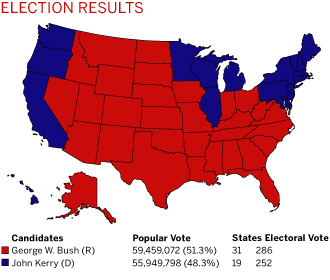Terrorism and the war in Iraq were clearly the central issues of the 2004 presidential race, overshadowing such perennial domestic concerns as the economy, health care, and jobs. The polarizing subject of Iraq was connected in the minds of many voters to the 9/11 attacks. The focus on military issues and foreign affairs in 2004 marks a strong departure from the previous three elections-in 1992, 1996, and 2000-which focused almost entirely on domestic issues.
In the months leading up to the conventions, the ad strategies of the two major parties followed along the traditional lines established during the Cold War era. President Bush's ads presented him as a steady commander in chief during dangerous times, while Senator Kerry's ads argued that the Democratic challenger is more in touch with the daily needs of the ordinary voter.
The most influential ads of the campaign were produced by a relatively small PAC committee, Swift Boat Veterans for Truth. Their ads, including "Any Questions?," generated widespread and constant news coverage throughout the month of August.
The Internet became an important medium during the 2004 campaign. Candidate Websites functioned as the online equivalent of campaign headquarters, used to organize, mobilize, energize, and raise funds from existing supporters. Influenced by the internet-fueled, grassroots campaign of Democratic primary candidate Howard Dean, the Democratic and Republican nominees took advantage of new social networking technologies and platforms.
The widespread availability of broadband access made it possible for video to be circulated easily on the Web. As a result, Web-based ads by the candidates, independent groups, and individual filmmakers, were widespread. Web ads tend to be edgier and more provocative than TV commercials, partly because they are often targeted to specific groups with strong opinions about candidates and issues, but also because of the nature of viral video.
Republican
George W. Bush for president
Dick Cheney for vice president
"Steady Leadership in Times of Change"
Although the Bush campaign ran a few positive ads to kick off the contest in March, the main goal of the President's advertising efforts was to portray Senator Kerry as a flip-flopping liberal in favor of high taxes and reckless cuts in defense spending. The goal has been to define Kerry before the Democrat has had a chance to define himself, and to evoke memories of George McGovern and Michael Dukakis. In fact, the Bush ad "Weapons" is virtually a remake of the 1972 Richard Nixon ad "McGovern Defense."
In late June, the Bush campaign issued a Web ad, "Kerry's Coalition of the Wild-Eyed," which attempts to depict Kerry and fellow Democrats as being excessively angry. The controversial ad intercuts images of Adolf Hitler from MoveOn’s “Bush in 30 Seconds” competition. Links to the ad were e-mailed to six million supporters, and graced the Websites of major news outlets.
The controversial August ad from Swift Boat Veterans for Truth ("Any Questions?") was the first from an outside group to inspire response ads directly from the opposing campaign (such as "Old Tricks").
Although it is unusual for an incumbent president to run such a negative ad campaign, it is not unprecedented. Lyndon Johnson's 1964 campaign similarly used attack ads against Barry Goldwater to divert attention from the president's problems with the growing quagmire in Vietnam and with resistance from white voters to his support of civil rights legislation.
Democrat
John Kerry for president
John Edwards for vice president
"Stronger at Home, Respected in the World."
Even before John Kerry became the presumed Democratic nominee, the Democratic Party benefited from a torrent of anti-Bush ads created and funded by issue-oriented Political Action Committees. The MoveOn PAC enlisted help from well-known Hollywood directors and personalities for its ads, and appealed to Internet audiences to fund the television broadcasts of their favorites, and even appear in them. The best MoveOn ads were those made by documentary filmmaker Errol Morris, including "Real People: Rhonda Nix," part of a series of interview ads with Republicans who were disenchanted with President Bush.
From the primaries through the conventions, John Kerry's TV ads were largely positive in tone, focusing on the candidate's biography and emphasizing domestic issues such as jobs and health care. The strategy was to draw attention to issues considered favorable to the Democratic candidate, and to introduce Kerry to a voting public that had already formed strong opinions about President Bush.
In late April through May, while Kerry’s positive biographical ads were playing on television, the Democrats and Kerry issued online attack ads using images of President Bush. Capitalizing on increasing public disaffection with events in Iraq, the Democratic National Committee issued "Mistakes Were Made," in which Bush’s remarks from an April press conference are set to ominous music.
In the face of strong attack ads from the Bush campaign and from independent groups, Kerry's TV ads became much more aggressive in tone as well, frequently attacking the President on Iraq and the economy. His campaign also created a few response ads for television within hours, such as "Juvenile," a rebuttal of the Bush ad "Windsurfing." The Kerry ad was made on the same day as the Bush ad, and both ads were given free play on the evening news.
